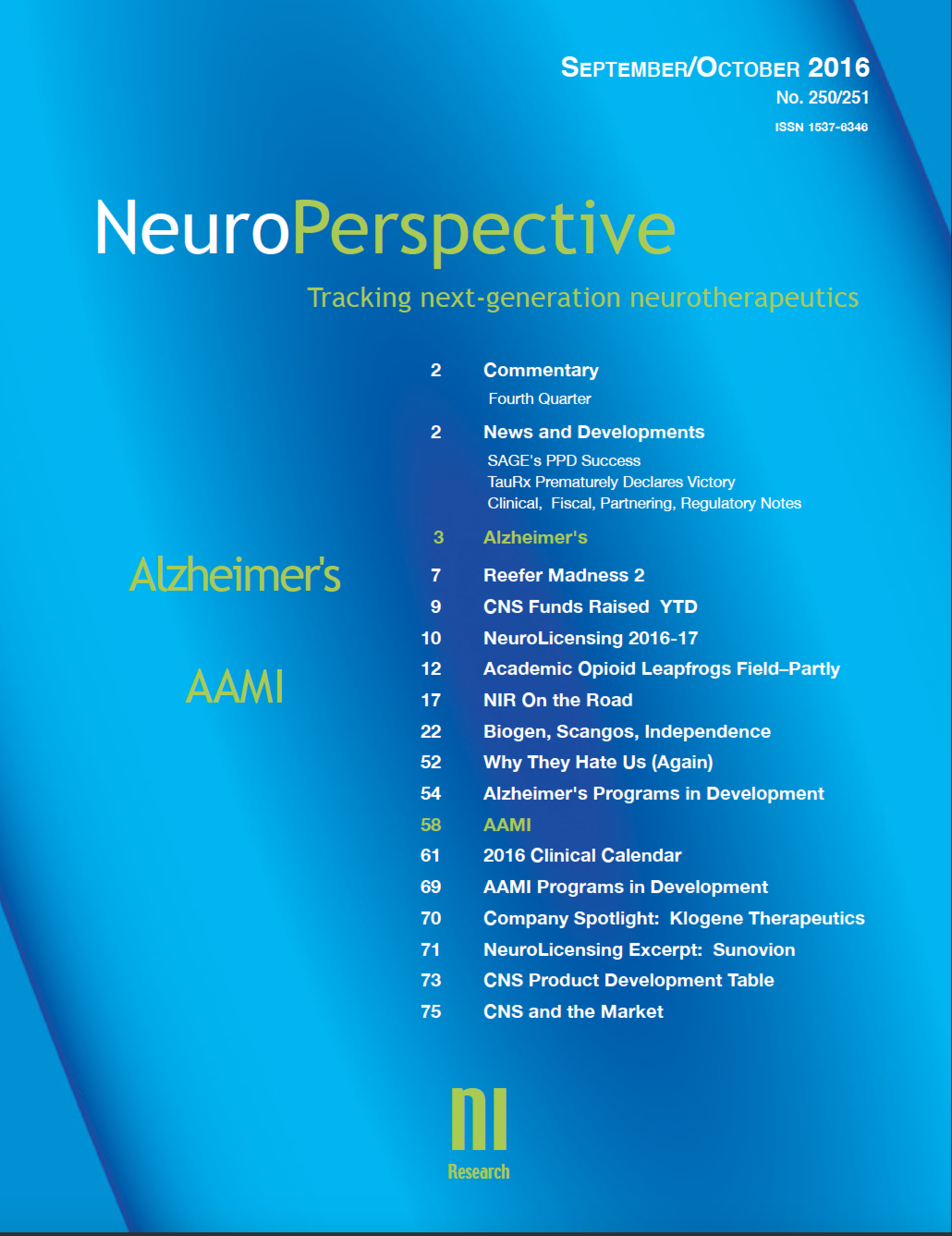The May/June 2020 issue of NeuroPerspective has been released, featuring in-depth reviews of Depression and PTSD.
Depression represents a glaringly incomplete success for psychopharmacology. The majority of patients do not find adequate relief from their first trial, and 25% do not find sufficient benefit from any of the antidepressants they try. Aversive side effects, including weight gain and sexual dysfunction, form a significant barrier to utilization, and the long delay to relief is counter-therapeutic. There have been advances and disappointments in the search for a Rapid-Acting-Antidepressant, the much-publicized utilization of off-label, IV ketamine echoed by JNJ’s success in developing intranasal esketamine, with the counterpoint of Allergan’s emphatic Phase III failure with rapastinel, which had seemed so promising. There are several programs that seem to have potential as RAADs, with positive efficacy findings from Axsome, Relmada, and Sage Therapeutics, though Sage’s zuranolone has not yet established the kind of durability that would make their intermittent dosing paradigm viable. Compass Pathways’ psilocybin program is now in PhII, offering what could be a rapid reset of a patient’s view of self and relationships. The almost ubiquitous prevalence of sexual dysfunction as a consequence of depression and SSRI/SNRI has been a significant deterrent to treatment and compliance, with glutamatergic drugs-in-development appearing to avoid this AE, and Fabre-Kramer’s Travivo demonstrating a beneficial impact on sexual functioning. Other antidepressant programs discussed in the review include those from Acadia Pharmaceuticals, ATAI/Perception, Blackthorn, Minerva Neuroscience, Navitor, and Novartis/Cadent.
PTSD (Post-Traumatic Stress Disorder) has once again risen in profile, this time as a result of the Covid-19 pandemic, another example of trauma born of both natural (tsunamis, firestorms) and human-made (combat, mass shootings, sexual/physical abuse) calamities. Therapeutic interventions can be focused upon attenuating the limbic system hyperactivation of PTSD and/or accentuating the cognitive rewriting of traumatic memory in a reconsolidation paradigm. The pharma industry has generally taken a passive approach to PTSD, leaving the funding of research to the DoD and VA in the US, but small companies are working in this undertreated and very large-scale domain, including Aptinyx, Azevan, and Nobilis. Tonix Pharma has emphasized PTSD in its persistently unsuccessful development programming.
The May/June issue also examines a flurry of recent data disclosures, with critical scrutiny of Axsome’s results in Alzheimer’s-agitation; Axon-Neurosciences’ long awaited Alzheimer’s data; and results from Roche, Lundbeck, and NoNO, the latter showing potential in ischemic stroke despite its trial failure. Supernus has finally broadened its portfolio, most importantly with its Navitor partnership. The impact of the Covid-19 pandemic on CNS drug development is considered, with data from AiCure, IQVia, and others regarding trial enrollment and compliance effects. The pandemic has thrown a major obstacle in the path of new drug launches, particularly disrupting Sage’s launch of Zulresso, threatening Intra-Cellular’s Caplyta introduction, and causing Neurocrine to postpone the launch of Ontgenys.
The Company Spotlight overviews ATAI Life Sciences and their creative portfolio of unorthodox therapies for depression, anxiety, and addiction, wherein their stewardship of Compass Pathways’ work stands out as relatively more conventional.

